unit2Grammar
新译林版九年级下册英语 Unit 2 Grammar课件
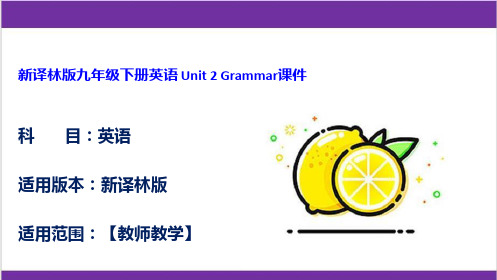
表示过去某个时刻或某一阶段正在进行的动作,常用时间状语为
then, at that time, at this time last night / year, when引导的时间状语 从句等,且过去进行时还常出现在while引导的时间状语从句中。
第十六页,共三十二页。
新课讲解
一般过去时与过去进行时的区别: 过去进行时强调动作的进行过程,而一般过去时强调动作的完
— Sorry, I ______ with my friends at that time.
A. swim
B. swam
C. will swim
D. was swimming
第十四页,共三十二页。
新课讲解
以上我们已经通过归纳总结和练
习对本课的语法内容有了一定的
了解,下面就让我
们根据之前练习的
考察情况进一步选 择讲解该语法项的
2. Simon came home, turned on the computer and checked his email.
3. Yesterday at 4 p.m., Simon was playing football.
4. Simon was playing computer games while Millie was
过去进行时强调动作的连续性,不可与确定的频度状语连用。
一般过去时强调动作的反复性,可与确定的频度状语连用。如:
The little girl was crying all afternoon yesterday. The little girl cried five times yesterday.
6. Mum _i_s_d_o_in_g__ the housework and Dad __i_s_w_o_r_k_i_n_gon the computer.
Unit 2 Grammar 牛津译林版英语九年级上册讲义 (含答案)
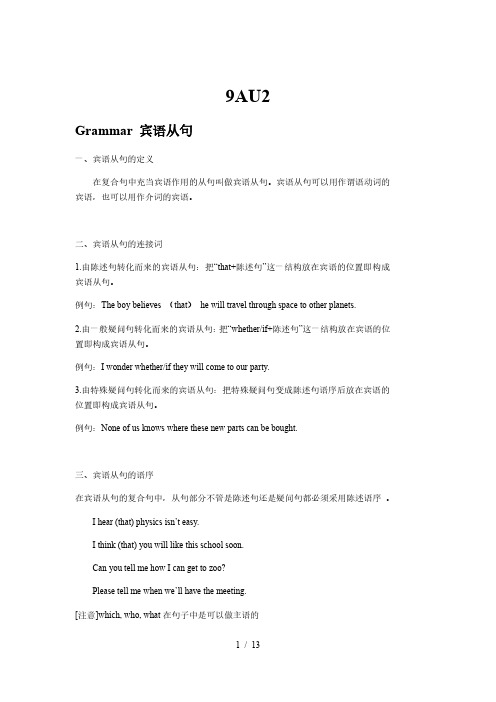
9AU2Grammar 宾语从句一、宾语从句的定义在复合句中充当宾语作用的从句叫做宾语从句。
宾语从句可以用作谓语动词的宾语,也可以用作介词的宾语。
二、宾语从句的连接词1.由陈述句转化而来的宾语从句:把“that+陈述句”这一结构放在宾语的位置即构成宾语从句。
例句:The boy believes (that)he will travel through space to other planets.2.由一般疑问句转化而来的宾语从句:把“whether/if+陈述句”这一结构放在宾语的位置即构成宾语从句。
例句:I wonder whether/if they will come to our party.3.由特殊疑问句转化而来的宾语从句:把特殊疑问句变成陈述句语序后放在宾语的位置即构成宾语从句。
例句:None of us knows where these new parts can be bought.三、宾语从句的语序在宾语从句的复合句中,从句部分不管是陈述句还是疑问句都必须采用陈述语序。
I hear (that) physics isn’t easy.I think (that) you will like this school soon.Can you tell me how I can get to zoo?Please tell me when we’ll have the meeting.[注意]which, who, what在句子中是可以做主语的I wonder who is Tom’s English teacher.I don’t know what can be avoided.四、宾语从句的时态1. 如果主句的时态是一般现在时,宾语从句该用什么时态就用什么时态。
I don’t think (that) you are right.Please tell us where he is.Can you tell me how I can get to the railway station?2. 如果主句的时态是一般过去时,宾语从句只能用相应的过去时态(一般过去时,过去进行时,过去将来时,过去完成时)。
unit2 grammar动名词做主语和宾语
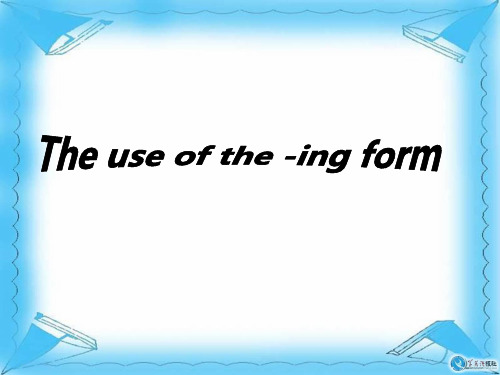
• 我们不知道要去哪儿。 我们不知道要去哪儿。 • There was no knowing where we would go. • 做这件傻事毫无意义。 做这件傻事毫无意义。 • There is no point doing such a silly thing.
动名词与不定式做主语时的比较:
1.作主语
动名词作主语时,句子有两种形式: 动名词作主语时,句子有两种形式: ①动名词直接置于句首主语的位置 上。
作主语
1)吸烟会致癌。 吸烟会致癌。 吸烟会致癌 Smoking may cause cancer. 2)说比做容易。 说比做容易。 说比做容易 Talking is easier than doing. 3)眼见为实 眼见为实 • Seeing is believing.
非谓语动词
• • • • • 非谓语动词包括 to do ; v-ing; v-ed V-ing可以做主语,宾语,表语, 可以做主语, 可以做主语 宾语,表语, 定语,宾补, 定语,宾补,状语
• Seeing is believing. • I like playing basketball. • Don’t leave me waiting outside in the rain
我并不想叫你生气。 我并不想叫你生气。 • I didn’t mean to make you angry. . • 帮助他人意味着帮助自己 • To help otehrs measns helping yourself.
E·go on doing 和go on to do
• • • • • • go on doing继续做一直在做的事; 继续做一直在做的事; 继续做一直在做的事 go on to do接着做另一件事。如: 接着做另一件事。 接着做另一件事 请接着做这同一个练习。 请接着做这同一个练习。 Please go on doing the same exercise. . 请做另外一个练习。 请做另外一个练习。 Please go on to do the other exercise. .
Unit 2 Grammar课件初中英语七年级下册(牛津译林版)

help mother do some housework cook dinner for buy her a present/ flower... write a letter/ postcard to her study hard ...
Post-task
一、用正确的时态填空
will
1. Women’ Day is coming.aIm__g_o_i_n_g__t_o_g_i_v_e___ (give) my mother a present.
2. -- What _a_r_e_ you ___g_o_i_n_g__t_o_b__e_ (be) when you
We shall/ will have classes tomorrow.
Will you have classes tomorrow?
Yes, I(we) will / shall.
后天
Will you have classes the day after tomorrow?
No, I (we) wiwllonno’t / shashllanno’t. t t
3W.We e aren’t gnooitndgotooudro outrohnoigmhte=wthoirsk
tonight/this evheonminegw. ork evening
4T.hTehtwe itnwin brontohteprlsayaren’tngeoxitnTguetosdpalyay
Sum up(总结) the time expressions in the simple future tense.
将来时的典型标志:
Unit2Grammar课件牛津译林版九年级英语上册
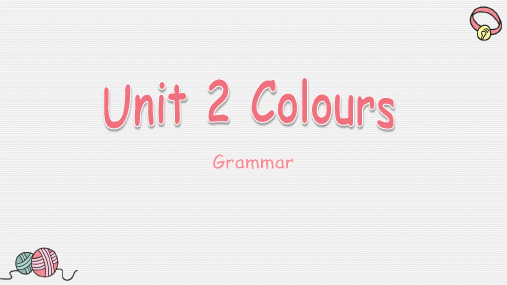
二、宾语从句的语序
三、宾语从句的时态
1. 当主句是一般现在时,宾语从句的时态不作限制,我们可以根 据句子的需要使用任何一种时态。(需要性原则)
I hear (that)
Jim __w_a_s___ (be) a worker two years ago. Jim __i_s___ (be) an English teacher now. Jim __w_i_ll__co_o_k___ (cook) dinner tomorrow. Jim __is_s_i_n_g_in__g__ (sing) a popular song now. Jim __h__a_s _b_e_e_n__ (be) to the Great Wall twice. Jim __w_a_s__p_la_y_i_n_g__ (play) basketball when his father came back.
一、宾语从句的连接词(引导词)
1. 当宾语从句是陈述句时(包括肯定句和否定句),要用连接词 that引导。that在句中没有词义,不充当任何句子成分,因此在 口语或非正式文体中常常被省略。
e.g. I’m think (that) blue is better than pink. “I’m feeling blue” means (that) “I’m feeling sad”.
一、宾语从句的连接词(引导词)
3. 当宾语从句是特殊疑问句时,连接词用疑问句中的疑问词,同时 把原来的疑问语序改为陈述语序。此时宾语从句常可用“疑问词+to do”的结构替换。
e.g. He asked how they would go to the park. = He asked how to go to the park. I don’t know what I should do next. = I don’t know what to do next.
Book 4 Unit 2 Grammar 动名词作主语、宾语

Book 4 Unit 2 Grammar 动名词作主语、宾语定义:动名词是由动词+ing变化而来,它仍保留着动词的某些特征,具有动词的时态和语态的变化,但没有人称和数的变化。
用以表达名词所不能表达的较为复杂的意念。
动名词的名词特征表现在它可在句子中当名词来用,作主语、宾语、表语、定语。
它也可以被副词修饰或者支配宾语。
作用:动名词具有名词的性质,因此在句中可以作主语、表语、宾语、定语等。
动名词的形式:(其否定形式是在v-ing前面加not)1.动名词的一般式所表示的动作通常是一般性动作,即不是明确地发生在过去、现在或将来的动作,或者是表示与谓语动词所表示的动作同时发生的动作。
We are very interested in collecting stamps.我们对集邮很感兴趣。
His coming will be of great help to us . 他来对我们大有帮助。
2.动名词的完成式所表示的动作或状态在谓语动词之前完成或结束。
He regrets not having taken part in the work. 他后悔没有参加这项工作。
We were praised for having finished the work ahead of time.我们因提前完成了这项工作而受到了表扬。
3.动名词的否定式是在v-ing前面加not。
He hated himself for not having work hard. 他悔恨自己没有用功。
He felt sorry for not having done the work well. 他为没有把工作做好感到难过。
4.动名词的被动式:当动名词的逻辑主语是行为承受者时,用被动语态。
如:I like being given harder work. 我喜欢接受难点的工作。
She is proud of being admitted into the university. 她为被大学录取而感到自豪。
牛津译林英语 九年级上册Unit2Grammar (共21张PPT)
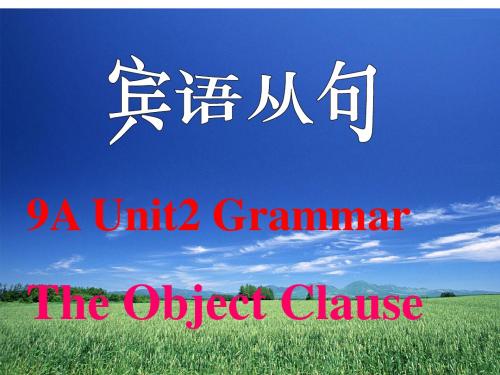
I’m sure that you will succeed. I was surprised at what he had done.
把下列句子合并成一句。
can (could) you tell me 等后。
将下列句子合并成一句
1. Ask him. Can he come?
Ask him if / whether he can come.
2. I wonder. Is it going to rain? I wonder if / whether it is going to rain.
2. 在动词不定式前
They asked me whether to go on a bike.
3. 当与or not连用,或提出两种选择时:
I don’t know whether or not they will come to our party. Tell me whether you’d like to walk or take a bus. 4. 宾语从句提前时: Whether this is true or not, I can’t say. 5. 在 discuss(讨论)等少数动词后引导 宾语从句时: We discussed whether we should hold a meeting.
9A Unit2 Grammar
The Object Clause
一、教学目标 学习宾语从句用法
二、教学重点和难点 1 由引导词that, if/whether引导 的宾语从句 2 宾语从句中时态的变化
Unit 2 Grammar 基础知识及练习 2021-2022学年牛津译林版九年级英语下册
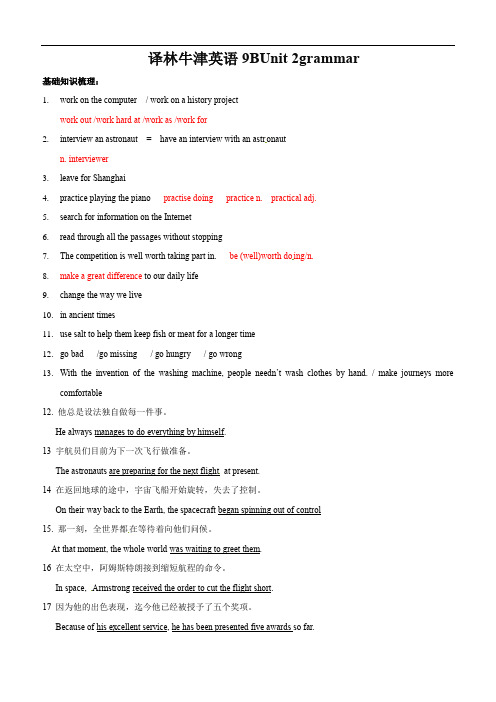
译林牛津英语9BUnit 2grammar基础知识梳理:1.work on the computer / work on a history projectwork out /work hard at /work as /work for2.interview an astronaut = have an interview with an astr onautn. interviewer3.leave for Shanghai4.practice playing the piano practise doing practice n. practical adj.5.search for information on the Internet6.read through all the passages without stopping7.The competition is well worth taking part in. be (well)worth do ing/n.8.make a great difference to our daily life9.change the way we live10.in ancient timese salt to help them keep fish or meat for a longer time12.go bad /go missing / go hungry / go wrong13.With the invention of the washing machine, people needn’t wash clothes by hand. / make journeys morecomfortable12. 他总是设法独自做每一件事。
He always manages to do everything by himself.13 宇航员们目前为下一次飞行做准备。
